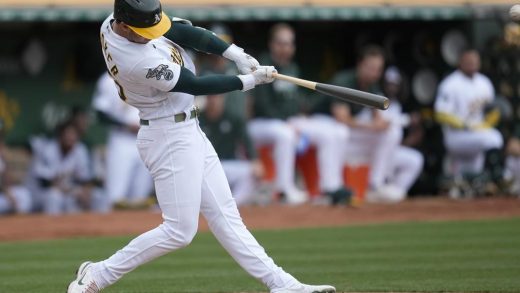Irish hip hop artists write their own narrative as movie actors and subjects

Ever since Walk Hard: The Dewey Cox Story comically skewered the worst clichés of the musical biopic, a lot of viewers have had a hard time taking the genre seriously.
Fortunately, Kneecap (in English and Irish, with subtitles) also refuses to take the genre seriously. A deliberately fictionalized story of a real group — the titular West Belfast, Irish-language hip hop trio — this wildly anarchic origin tale features the actual musicians (Naoise Ó Cairealláin, Liam Óg Ó Hannaidh and JJ Ó Dochartaigh) playing versions of themselves, their characters going by their stage names — Móglaí Bap, Mo Chara and DJ Próvaí.
With a group so rude, raucous and controversial they’ve been kicked out of their own gigs, the results are frenetic, fiercely political and often very funny.
Helen Sloan / Sony Pictures Classics
Liam ‘Mo Chara’ Óg Ó Hannaidh, JJ ‘DJ Próvái’ Ó Dochartaigh and Naoise ‘Móglái Bap’ Ó Cairealláin in Kneecap.
While cheerfully blowing up biopic tropes, the three men, who co-script with director Rich Peppiatt, also have a go at dead serious Irish drama. Kneecap opens with a voiceover narrative suggesting that every film set in Northern Ireland begins with exploding cars and men in balaclavas.
Well, clearly not every film, as we immediately cut to a club scene, with lights strobing, music pulsing and two young guys, Mo and Móglaí, super-high on ketamine. They’re selling party drugs and soon running from the police.
When Mo is arrested, he refuses to speak English as an act of political resistance, and an Irish translator is called in, resulting in a smart, subversive three-way comedy routine with the presiding policewoman (Josie Walker).
The translator is JJ, soon to be DJ Próvaí. Older than Mo and Móglaí, he teaches at a Belfast secondary school but finds the Irish language textbooks stuck in the past. It’s hard to reach bored 21st-century adolescents with sample phrases like “The girl cut turf in the rain.”
When JJ comes across some of Mo’s poetry — angry, incisive verses about everyday working-class Belfast life written in the Irish language — he decides all it needs is a good beat. That will get the kids’ attention.
Kneecap is born. Cue the montage of sex, drugs and music.
The sex is comic. Mo has an interesting kink: he finds Union Jack-waving, monarchist Protestants kind of a turn-on. He and his girlfriend Georgia (Jessica Reynolds) talk dirty with opposing political slogans.
The drug scenes have a surreal, sometimes rather sweet feel, using whimsical animated effects, including some lo-fi claymation. (Kneecap is actually one of the best drug movies since Trainspotting, which is no easy accomplishment. Watching other people get high is not inherently cinematic.)
Even the politics are played for laughs, as when Mo and Móglaí have a run in with the Radical Republicans Against Drugs, a self-serious paramilitary gang who find the boys’ “hedonistic lifestyle” unbecoming — or who maybe just want a cut. There’s a Monty Pythonesque scene in which the leader of the group complains about rival radical republican gangs like the New Republicans Against Drugs and the Republican Volunteers Against Drugs. (“Splitters!”)
Director Peppiatt starts with a style rooted in music videos but goes beyond that with offbeat visual rhythms and lots of Edgar Wright-like kinetic energy. And underneath all this rude, reckless, comic action, there are some sneakily serious ideas.
In flashback scenes, we meet Móglaí’s father, Arló (Michael Fassbender), a member of a militant Republican group. Speaking in Irish, a language once banned by the British, he inculcates in his young son the idea that “every word of Irish spoken is a bullet fired for Irish freedom.”
Arló then promptly disappears, supposedly falling off a fishing boat, even as rumours persist that he’s vanished into the Republican underground.
Even in his absence, the father seems to define the son’s life. Against the stern, single-minded revolutionary commitment of their elders, Móglaí and Mo call themselves “ceasefire babies,” born after a 1994 agreement that largely ended the violence in Northern Ireland. For these young men, there’s an uncertainty about how to go forward with the political process and a poignant sense that “we’re only ever going to be the moment after the moment.”
Ó Cairealláin, Óg Ó Hannaidh and Ó Dochartaigh have no problem being musicians, but they also hold their own as actors. Their characterizations aren’t that deep, but they are vivid, and there’s room for some minor characters, such as Móglaí’s mother Dolores (Simone Kirby).
She’s been left in limbo, neither wife nor widow, but against her husband’s lionized machismo, she offers her own act of revolt. JJ’s girlfriend, Caitlin (Fionnuala Flaherty), who’s trying to advance the Irish language through legislation, also gets to say her piece, the script thus avoiding the tired musical biopic cliché of “the shrewish first wife.”
Fassbender is great, of course, but he’s a gravitas guy — he’s done the darker dramatic version of this story in Steve McQueen’s Hunger – and his character sometimes seems to be looming out of another movie altogether.
Taking the Irish tragedy of the Troubles and turning it into farce, the film has moments of dissonance, and its attitude can feel flip, irreverent, maybe even offensive at points. (The group’s name is a particularly dark joke.) But in deciding that the “bullets” they fire for Irish freedom will be metaphorical, Kneecap makes a persuasive argument for the power of language, stories and culture — and the need for every generation to find its own way.
Alison Gillmor
Writer
Studying at the University of Winnipeg and later Toronto’s York University, Alison Gillmor planned to become an art historian. She ended up catching the journalism bug when she started as visual arts reviewer at the Winnipeg Free Press in 1992.
Read full biography
Our newsroom depends on a growing audience of readers to power our journalism. If you are not a paid reader, please consider becoming a subscriber.
Our newsroom depends on its audience of readers to power our journalism. Thank you for your support.
Credit: Irish hip hop artists write their own narrative as movie actors and subjects


